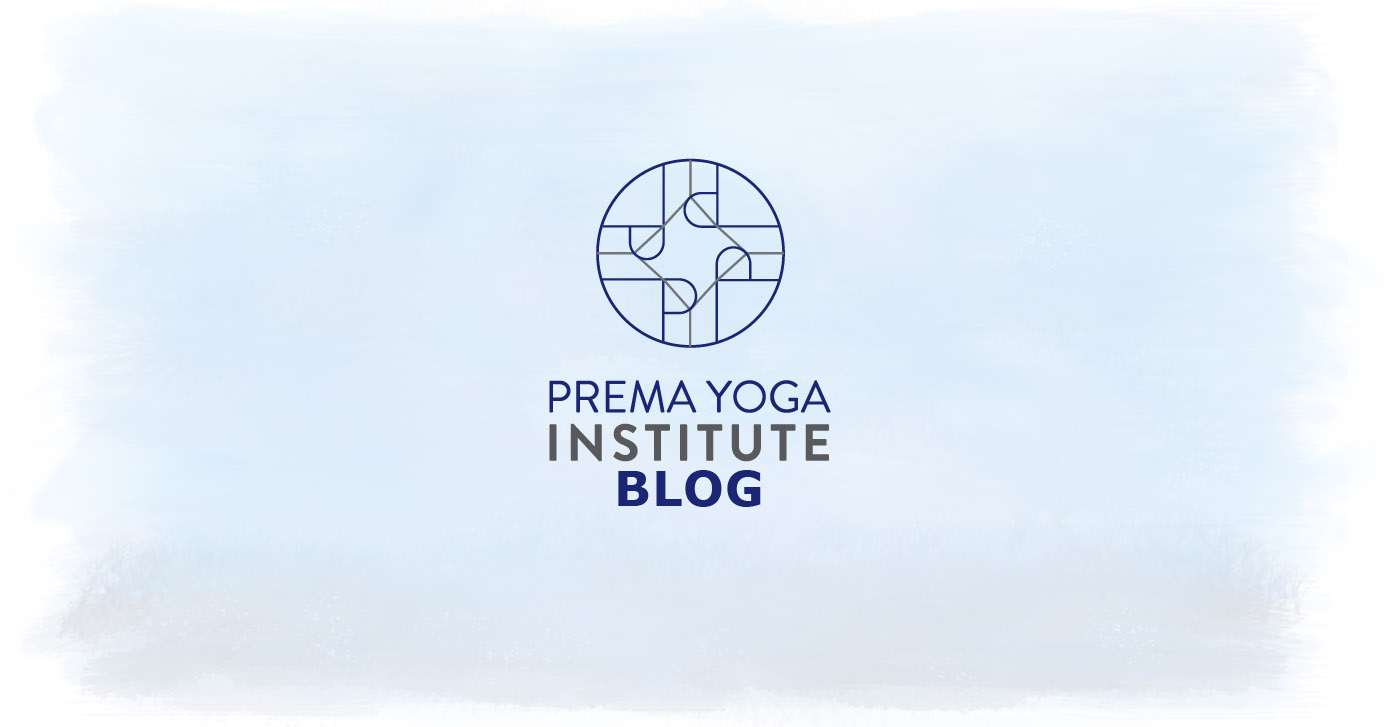
Faculty Spotlight: Therapeutics Essentials Teacher Jon Witt
As a student in Prema Yoga Institute’s Yoga Therapy Certification program, I’ve had the privilege of studying under Jon Witt who, in partnership with Dana Slamp, teaches the foundational one hundred-hour Yoga Therapeutic Essentials course.
Jon has been a yoga professional for over a decade, having begun his teaching career in tandem with the opening of the flagship Pure Yoga studio in Hong Kong. He completed his Yoga Therapy training in Mysore, India, under the aegis of Yogacharya V. Venkatesha. Now based in New York City, Jon teaches at both Pure Yoga locations, and is a practicing yoga therapist who also offers teacher trainings and workshops.
As a student in Prema Yoga Institute’s Yoga Therapy Certification program, I’ve had the privilege of studying under Jon Witt who, in partnership with Dana Slamp, teaches the foundational one hundred-hour Yoga Therapeutic Essentials course.
Jon has been a yoga professional for over a decade, having begun his teaching career in tandem with the opening of the flagship Pure Yoga studio in Hong Kong. He completed his Yoga Therapy training in Mysore, India, under the aegis of Yogacharya V. Venkatesha. Now based in New York City, Jon teaches at both Pure Yoga locations, and is a practicing yoga therapist who also offers teacher trainings and workshops.
I personally found Jon to be a remarkable teacher. I work in higher education, where it’s common to encounter academics who have mastered their subject to a degree that actually inhibits their ability to effectively teach it on an introductory level; in other words, they’ve forgotten what it’s like to be a beginner. If you were to attend Jon’s Saturday afternoon Hatha class at Pure Yoga East (which I recommend), you would witness him guide a room full of yogis with wide-ranging levels of experience, strength, flexibility and injury through an hour-long sequence, and somehow attenuate his teaching to encompass the individual needs of entire class. He not only remembers what it’s like to be a beginner, he seems to remember every step along the road to mastery, and speak to it with specificity and tact, all in the course of one class. As a lifelong teacher and student, I can say with confidence that it’s a rare skill to encounter.
In preparation for this interview, I asked some of Jon’s current and previous students at Prema Yoga Institute to reflect on their experience learning from him. Here’s a representative sampling of their responses:
Jon is a gifted teacher who guides you from strength to strength.
—Teri Ryan, PYI graduate
Jon Witt creates an environment that is safe and comfortable. He relays his expert knowledge and ability with creativity, clarity, charm and wit. Jon’s energy is full of love and caring for both the practice and for his students.
—Judy Glassman, PYI graduate
Jon is deeply knowledgeable and skilled in alignment and anatomy, making for a space that feels utterly safe and secure. His casual and friendly style allows for a student to feel totally open to taking modifications and breaks if things get too challenging. I learn something new about my body and what it needs every time I take class with him.
— Jennifer Cabrera, PYI student
I recently had the opportunity to sit down with Jon and ask him some questions about training yoga professionals in advance of the next course offering of Therapeutic Essentials at PYI, which begins on February 7th. What follows are excerpts from that conversation.
Molly Goforth: What in particular drew you to yoga therapy?
Jon Witt: I had been teaching yoga for probably about seven years and I came to a realization that many of the classes I was teaching were more dynamic and progressive, and I enjoyed teaching them. But I was also teaching beginners, and I found that many people couldn't do most of things within that basic class. And I really wanted to help people who were struggling or who were dealing with limitations or with injuries. That was what drew me in: that I wanted to be able to work with someone who was older, or who was, for example, working through a chronic disease.
MG: What do you think yoga therapy addresses particularly or uniquely well, as opposed to another type of complementary therapy?
JW: Yoga therapy provides something different in that it’s purposely calming. If you take someone who has a knee injury or a back injury, they probably don’t realize that they’re overly stressed, and that simple breathing techniques can make a difference. Simply repositioning the body can make a dramatic difference. I mean, chiropractic therapy and physical therapy, aromatherapy, all of these thing have their value and their place. But a consistent yoga practice is really what helped me the most. A consistent yoga practice just works. Yoga has worked for so long. And especially if you haven’t been exposed too much to yoga, you would benefit even more greatly than someone who has.
MG: Can you expand on that?
JW: If you’re someone who has a background in yoga, it's all very repetitive. If you’re doing something repetitively, at some point it still continues to be beneficial, but not as beneficial as it would be to someone who has been training with weights, or running, who has never been exposed to yoga or breath work. Yoga is a completely different form of training, so they will adapt in a completely different way.
MG: Could you give me an example?
JW: Take someone who’s been lifting weights their whole life. They can’t raise their arms over their head, and it's progressively getting worse. Repositioning them on the floor and teaching them basic breathing techniques can completely change the way they stand and walk. And you’re able to see what’s been declining in their routine over all this time.
MG: Such as range of motion?
JW: Sure. Just opening that up, shifting that perspective, allows them to go back to the gym and train in ways they couldn’t before. Before they were just pushing through it, but now they can thrive in it. It's a shift in perspective.
MG: Speaking of perspective, when you’re training yoga professionals, whether it’s teacher training or yoga therapy training, is there a core belief or a residual message that you want them to come away with after studying with you?
JW: I mean, to love your students. Take good care of your students. Look out for their best interest. In any yoga setting where you are being looked after by another individual, the intentions of that individual should be high. If you go in with that intention of care, whether it’s a private session or a public class, you’re bound to be successful.
I think initially, when someone first starts teaching yoga, they're most likely not going to be very good at it. But if they have the intention of helping people, over time they will refine their teaching. They will get better and they’ll have a sustainable teaching practice where it becomes a profession. When someone doesn’t really have that love for people, it makes teaching less possible.
MG: What’s the most common injury or physical problem you see in your yoga therapy practice?
JW: I think the most common injury would be back pain. From lack of activity, or too much of one activity, or it’s simple postural issues, often from the way they sit. I mean, most people go set up their cubicle or their office in a particular way, and it's been like that for so long that they're always turning to one direction.
MG: Oh, you mean like, the phone is to the left, and they’re always turning to the left, for years and years?
JW: Yes. They’re spending eight hours a day doing it. They can make a difference just by changing their workspace around, as an example.
MG: Wow, that kind of blows my mind.
JW: It doesn’t really take that much to actually help someone, it’s really just using the right techniques and the right kind of approach.
MG: Can you expand on that?
JW: I think with most yoga teachers, when they find themselves unsuccessful, it’s because they’ve made it too dynamic; they're not using the right approach and that's why they're not finding success with the people that they're working with. They don’t know how to scale it back.
MG: By too dynamic you mean too challenging at the beginning?
JW: Yeah. Dynamic has its place, if someone isn’t ready to be more quiet or be more still, but you have to be able to adjust. It’s really just knowing your student. And communicating. With private clients, if you’re communicating and paying attention in the session, and you’re communicating after the session within that week, and then in the next session…you’re slowly building a rapport, and the information you’re getting from the student will basically tell you how you should teach them. And on top of that, if you’re observing them in practice, you’ll be able to see what they need.
MG: Final question: is there anything that you find particularly inspiring about training yoga professionals, whether it’s teacher training or yoga therapy training, or anything that makes you feel excited about the future of yoga therapy?
JW: It’s good to know that there are other teachers who are willing to modify and adapt a practice for someone who needs it, as opposed to just giving them a general practice, something that's not appropriate, maybe something that’s actually going to harm them. So it's nice to know that people actually are interested in working with someone who is experiencing some limitations or who’s really struggling or even bit desperate, and they really want to get better but they don't necessarily know how. It's good to know that younger teachers are willing to do more study than just general study and be able to work with just about every age or ability.
MG: Jon Witt, thank you so much for your time.
JW: You’re welcome.
—————-
Enrollment is currently open for Yoga Therapeutic Essentials at Prema Yoga Institute, with Dana Slamp and Jon Witt. The course runs from February 7th – March 1st.
___________________________________________________________________________________
Molly Goforth is a yoga and meditation teacher and a student at Prema Yoga Institute. She specializes in accessibility and trauma-informed yoga teaching and practice.





